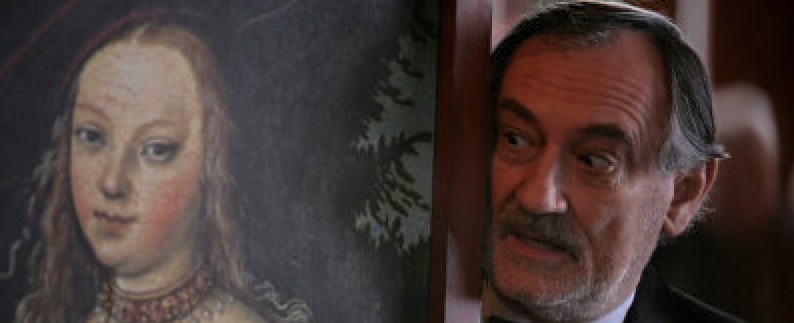|
Ukraine will be prominently represented at the Tribeca Film Festival
with an International Premiere of TWO IN ONE (DVA V ODNOMU), the latest
feature film by Kira Muratova, perhaps the most internationally celebrated
and controversial Ukrainian film director, during Festival week April
25 to May 6, 2007 in New York City.
Festival line-up was announced on March 12, 2007 and news of the film’s
Official Selection in the World Narrative Feature Competition sent ripples of
anticipation throughout the Ukrainian film community especially for many who
have ardently taken up the cause for the revival of Ukrainian national cinema.
Since Ihor Strembytsky’s THE WAYFARERS surprise win of the highly prestigious
Golden Palm for the Best Short (Palme d’Or du court métrage) at
the Cannes International Film Festival in 2005, Ukrainian cinema showed films
- preciously few and far between. Ukrainian filmmaking is plagued by an
endless litany of paralyzing ailments: government indifference, bureaucratic
ineptness at the Ministry of Culture, film distribution totally dominated by
Russian interests, national oligarchs reluctant to invest in Ukrainian films,
openly hostile Ukrainian television corporations, lack of a nationally conscious
cinematographic cadre, continuous Russification with feeble resistance from a
civil society, few talented Ukrainian filmmakers still dependent upon state support
with an inability to get private funding for their projects. Against these odds,
the relatively few films produced in 2006 were either embarrassingly amateurish
or had nothing Ukrainian about them or both.
From the point of view of Istvan Szabo’s description of his country’s
cinema of quality “The characteristic feature of a good Hungarian film
is that it expresses something about Hungary”, sadly, there were no “good” films
made in Ukraine last year.
One can hardly accuse Muratova of amateurishness, on the contrary,
she has shown originality and skill as a master of her métier
- a great, original, puzzling master. Her refusal to follow the dicta
of socialist realism, the aesthetic orthodoxy of Russian Bolshevik
ideology often got her into trouble with the Soviet regime which deprived
her of film projects and almost destroyed her creatively and professionally.
She was perhaps the only Ukrainian film director for whom Ukraine’s
independence meant a true creative revival. While her colleagues complained
about the Ukrainian government and society’s lack of appreciation,
Muratova continued to make one critically acclaimed film after another:
THE SENTIMENTAL POLICEMAN (1992), ENTHUSIASMS (1994), THREE STORIES
(1997), LETTER TO AMERICA (1999), MINOR PEOPLE (2001), CHEKHOV’S
MOTIFS (2002), THE TUNER (2004).
More importantly, Muratova’s personal history and oeuvre are
deeply symbolic of Ukraine’s misfortunes under the Soviet occupation
and the lingering Russian Imperial legacies the country has wrestled
with since independence.
Born Kira Georgievna Korotkova in 1934 in the village of Soroki (now
in Moldova) she was reared in a Russian cultural environment. “My
first language, my love of country, was Russian and Russia,” she
is quoted as saying in an authoritative and only English language study
of Muratova written by Jane Taubman, Professor of Russian at Amherst
College.
Muratova studied at the VGIK (All-Union State Institute of Cinematography)
a famous cinematographic school in Moscow and Stalin’s idea for
media centralization thus continuously controlling filmmaking throughout
today’s former USSR republics. VGIK was to replace individual
film schools for every national Soviet Republic thwarting the rise
of nationally conscious filmmakers while cementing cinematography as
a tool of russification and Imperial subjugation. Existing film schools
in Ukraine and other Republics were either closed down or decimated
to the level of a joke. Muratova’s creative history is evidence
of how effective Stalin’s imperial designs were proven to be
to this day.
Her films often defy Communist ideological orthodoxies that mandate
a non-conflicted, positive, and optimistic portrayal of the Soviet
life. To say that such a stance took a lot of courage would be an understatement.
Concurrently and in a more subtle way, Muratova became an apologist
for Russian Imperial domination. However, as with other great representatives
of Russian culture, she seemingly hasn’t entertained the idea
that the Ukrainian quest for intellectual freedom may deserve her support.
Upon graduation from VGIK, Muratova, along with her first husband
director Oleksander Muratov, was assigned to the Odesa Film Studio.
From the early 1960s, she lived and worked in Odesa. Her first films
BY THE STEEP RAVINE (1961), OUR HONEST BREAD (1964), BRIEF ENCOUNTERS
(1967), heralded the arrival of a talented non-conformist
filmmaker. The regime quickly neutralized her advance as a filmmaker
by first shelving her films and then not allowing her to make films
for long periods of time.
The moment of truth arrived with THE ASTHENIC SYNDROM (1989), a scathing
and shrill criticism of Soviet society that was banned by Soviet censorship
in the middle of the Gorbachev’s perestroika. At this point,
the international film community took notice of her bold cinematic
statements she was awarded with the Silver Bear at the Berlin International
Film Festival-1990.
Having become a celebrated auteur, Muratova also became a one-person
battlefield of cultures: imperial Russian and postcolonial Ukrainian.
Moscow, reluctant to accept and put up with the loss of its dominions
has continued the policy of imperial appropriation in the cultural
sphere directed at Ukraine as a former colony. Muratova with her personal
history and culture was a lucrative target of such a policy and its
inviting conduit.
She is and has always considered herself Russian – linguistically
and culturally – and has used Russian literature as a source
of inspiration and references for her films. Despite the fact that
she lived in Ukraine for more than 45 years, she has contrived to exclude
Ukraine from her films or, at best, to relegate her to the margins,
reduce the colonized to a perfect state of transparency and invisibility.
That not a single of more than a dozen of her films is in Ukrainian
is not the point. Ousting the Ukrainian language from filmmaking was
largely a fait accompli before Muratova even started. The truly remarkable
thing is how Muratova who lives in the Ukrainian city of Odesa which
is far from being exclusively Russian in terms of language and culture
has remained blind, indifferent, uninterested, some may say snobbish
- to those who have for decades of Soviet regime been brutally assimilated
into the Great Russian culture.
One is tempted to apply to Muratova and her Ukrainian predicament
the thought expressed by the French philosopher of cinema Gilles Deleuze
on a different superficially but, in the eesence of things, similar
occasion:
«The cinema author finds himself before a people which from the point
of view of culture, is doubly colonized: colonized by stories that have come
from elsewhere, but also by their own myths become impersonal entities at the
service of the colonized …»
Both these dimensions apply to Muratova’s stance as an artist
towards Ukraine, her new and unexpected – if not unwanted –home
country (she is a national of Ukraine). Her films are, or at least
up until now have been, in deed “stories that have come from
elsewhere”, Ukrainians in her films have been impersonal entities,
just as they have under the Soviet regime. By presenting or refusing
to notice them Muratova, paradoxically, portrays the level of their
dehumanization by the colonizer in a way that is unparallel by its
cruel realism. This is not to say that Muratova’s sympathy through
rejection is her true intention.
Using her celebrity status, Muratova has successfully resisted timid
attempts by the Ukrainian government to make the funding conditional
on using and promoting the Ukrainian language and culture that, in
the sphere of filmmaking, has been reduced to the state of clinical
death. Through Ukraine’s Ministry of Culture, Muratova enjoyed
the “status of the most favored director” where most of
her films were either fully or in part funded by the Ukrainian government’s
money. Yet she seems unaffected by any obligation to reciprocate in
her filmmaking or personal attitude. Ukrainian viewers can identify
with Muratova’s films on the condition that they assume the point
of view, the language, and culture of the colonizer as their own, only
if they give up their identity, only when they negate their own humanity.
By this logic, she, intentionally or not, works as an agent of the
Empire. This is a cruel irony and a fascinating moral ambivalence teetering
along Muratova’s cultural posture. Ironically, “cruel” is
the epithet that time and again resurfaces in critical reviews of Muratova’s
oeuvre.
While a citizen of Ukraine, Muratova does not like to be presented
as a Ukrainian director. To the question as to where she belongs as
a director, Muratova would respond, “I belong to the world”,
a pronouncement echoing the increasingly anachronistic – some
would say ominous – Russian Messianism that refuses to stay in
the past. Her stature as the spokesperson for creative freedom, champion
of human individuality in even the oddest of its manifestations, finds
itself in open conflict with what seems to be old Imperial Russian
condescension towards “the colonized”.
As if feeling the increasingly untenable morality her position imparts,
Muratova has finally invited the celebrated Ukrainian actor Bohdan
Stupka, considered by many an archetype of Ukrainian identity on screen
to star in her latest film, TWO IN ONE with talk that Muratova plans
to make two versions – one in Russian and the other, for the
first time, in the Ukrainian language.
All this will give her film’s World Premiere at Tribeca Film
Festival an added intrigue, particularly if her producer Oleh Kokhan
(also spelled Oleg Kohan) succeeds in convincing her to come to New
York. Muratova is known to loathe airplanes and long flights, having
turned down an invitation to a retrospective honoring her on the occasion
of her 70th birthday by the Lincoln Center Film Society of New York
in Spring 2005. The Lincoln Center Film Society presented her and her
films as Russian only.
TWO IN ONE will compete with seventeen other films by both renowned
and new filmmakers from the United States, France, China, Lebanon,
Iran, Israel, Russia, Turkey, Panama, Mexico, Germany, and other countries.
The synopsis of her film issued by the Tribeca Film Festival should
provoke even the most inveterate couch potatoes to come to the film
festival screening:
“TWO IN ONE (DVA V ODNOM), directed by Kira Muratova, written
by Evgenii Golubenko and Renata Litvinova (Ukraine) International
Premiere. This celebrated director’s “exquisite cruelty” appears
front and center when the death of a stage actor turns a theatrical
drama into a real one. Two in One’s two parts, “Stagehands” and “Woman
of a Lifetime” celebrate the psychological richness that lurks
just beneath the surface of banal reality—if murderous stagehands,
lascivious fathers, and vengeful daughters can be described as banal.”
The Ukrainian Film Club of Columbia University has been in contact
with both Kira Muratova and the film’s producer Oleh Kokhan in
an attempt to arrange a visit to Columbia University during the Tribeca
Film Festival. While it is unclear whether Muratova will come to New
York, producer Oleh Kokhan expressed interest in coming to Columbia
University and talking about this latest film by Muratova. It is possible
that the actor Bohdan Stupka will also come.
Yuri Shevchuk,
Columbia University |


